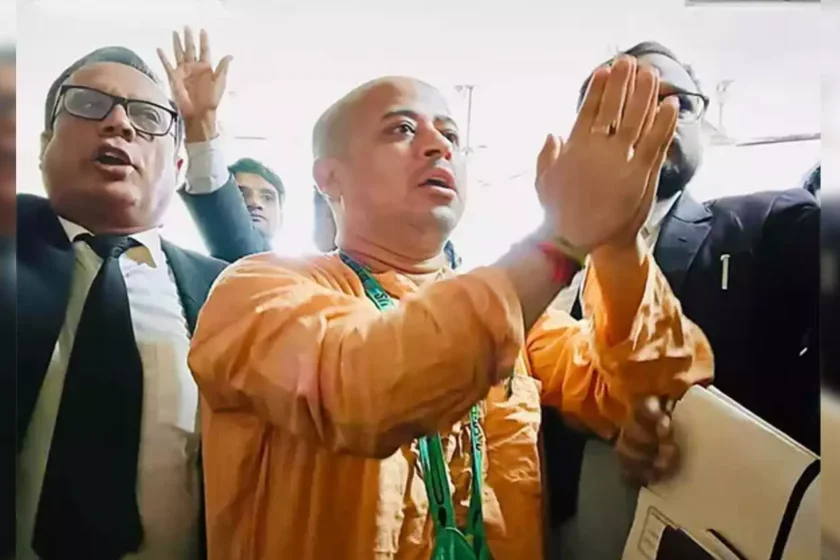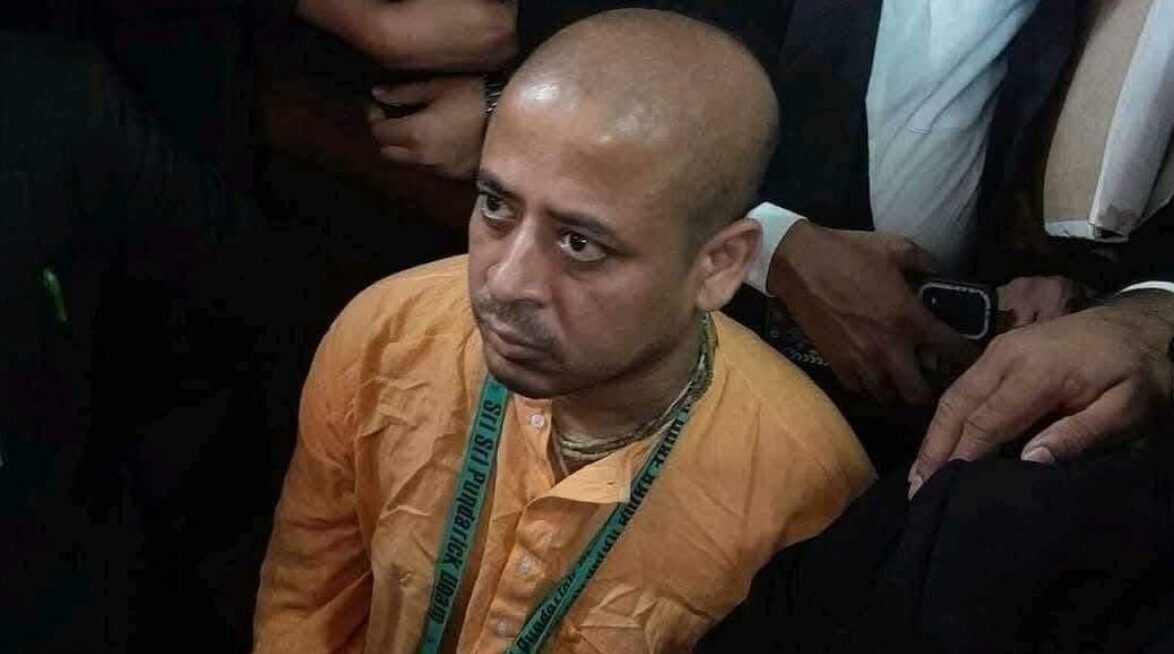Bangladesh Government Responds to Global Criticism Over Hindu Priest’s Arrest, Pledges Commitment to Communal Harmony
The arrest and subsequent jailing of Hindu priest Chinmoy Krishna Das Brahmachari, a prominent figure in Bangladesh’s religious landscape, have sparked widespread international outrage. As backlash mounts from Hindu communities around the world, the Bangladesh government, led by Chief Advisor Muhammad Yunus, has taken a defensive stance. It asserts its dedication to maintaining communal harmony amid growing criticism of its handling of minority rights and religious freedom in the country.
Arrest and Legal Proceedings
Chinmoy Krishna Das, who serves as the spokesperson for the Bangladesh Sanatan Jagaran Mancha and heads the Pundarik Dham in Chittagong, was apprehended by the Detective Branch (DB) of the Dhaka Metropolitan Police on Monday. The arrest occurred at Hazrat Shahjalal International Airport around 4:30 pm. The following morning, Das was presented before Judge Kazi Shariful Islam at Chittagong’s 6th Metropolitan Magistrate Court, where his bail plea was denied. The judge ordered his detention, sending the Hindu religious leader—who is also associated with the International Society for Krishna Consciousness (ISKCON)—to jail.
Also Read: Burn Injuries: Understanding the Legal Aspect in Dallas
The decision to imprison Das has drawn sharp criticism, not only from Hindu organizations within Bangladesh but also from Indian authorities. India’s Ministry of External Affairs (MEA) issued a statement condemning the arrest and highlighting a troubling trend of violence and discrimination against minorities in Bangladesh.
India’s Strong Reaction
The MEA expressed “deep concern” over Das’s arrest and the subsequent denial of bail. The ministry linked the incident to a broader pattern of persecution faced by religious minorities, particularly Hindus, in Bangladesh.
“This incident follows multiple attacks on Hindus and other minorities by extremist elements in Bangladesh. Documented cases of arson, looting of minority homes and businesses, theft, vandalism, and desecration of deities and temples are deeply troubling,” the MEA noted.
The Indian government also criticized the detention of a religious leader who was peacefully advocating for legitimate demands. Additionally, the MEA condemned the violence faced by protesters opposing Das’s arrest and called on Bangladesh to ensure the safety of all its citizens, including the right to peaceful assembly and freedom of expression.
Bangladesh’s Response to International Criticism
In response, the Bangladesh Foreign Ministry issued a statement emphasizing that the issue was an internal matter and accusing critics of misrepresenting the facts. The ministry asserted that Das had been arrested on specific charges and rejected claims of religious persecution.
“It is with utter dismay and a deep sense of hurt that the Government of Bangladesh notes that the arrest of Sri Chinmoy Krishna Das has been misconstrued by certain quarters,” the statement read.
The Bangladeshi government further stressed its commitment to protecting the rights of all citizens, regardless of their religious identity. It highlighted the peaceful observance of Durga Puja across the country as evidence of its efforts to uphold religious harmony.
Violence and Controversy
Meanwhile, tensions escalated in Chittagong as clashes erupted between police and Das’s followers at the Chattogram Court Building. Tragically, a 32-year-old lawyer, Saiful Islam Alif, was killed during the violence. The Bangladesh Foreign Ministry described the incident as a “brutal killing” and vowed to investigate the matter thoroughly. Security has been heightened in the port city to prevent further unrest.
However, Hindu leaders in Bangladesh have denied any involvement in the lawyer’s death. Kanchan Acharjee, a central leader of the Sammilita Jagaran Jote, called for a fair investigation into the incident and demanded that the perpetrators be brought to justice.
Broader Implications
The arrest of Chinmoy Krishna Das and the subsequent fallout have reignited concerns over the treatment of religious minorities in Bangladesh. Despite assurances from the government, incidents of violence and discrimination against Hindus and other minority groups remain a contentious issue. Reports of arson, vandalism, and attacks on temples continue to surface, raising questions about the effectiveness of the government’s efforts to foster inclusivity and protect minority rights.
Also Read: Jacksonville Car Accident Attorney: Navigating Legal Pathways to Justice
India’s intervention highlights the regional implications of such incidents. The relationship between the two neighboring countries is built on a foundation of shared history and cultural ties, and incidents like these threaten to strain diplomatic relations.
Conclusion
The Bangladesh government finds itself in a precarious position, balancing domestic pressures with international scrutiny. While its commitment to communal harmony has been reiterated, actions on the ground often paint a contrasting picture. As global attention remains fixed on this issue, the need for transparency, justice, and genuine efforts to protect minority communities has never been more urgent.
The outcome of this controversy will likely serve as a litmus test for Bangladesh’s ability to uphold its democratic values and ensure equality for all its citizens. For now, the world watches closely, hoping for resolutions that reaffirm the principles of justice and inclusivity.


